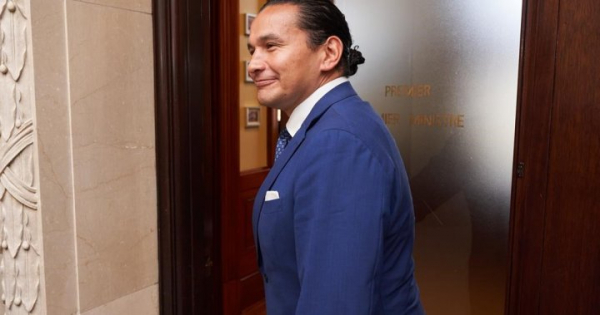Manitoba's Carbon Conundrum: Premier Wab Kinew Advocates for Review Amidst Economic Realities
Manitoba Premier Wab Kinew is calling for a reassessment of the federal carbon price, colloquially known as the carbon tax, within his province. In an interview with The West Block host Mercedes Stephenson on January 7, Kinew emphasized that Manitoba presents a compelling case for revisiting the carbon pricing mechanism. He asserted that Manitobans seek relief, particularly considering the substantial efforts over the past five decades to establish a low-carbon electricity grid.
Kinew highlighted Manitoba's significant investment in creating a low-carbon infrastructure, positioning the province for a sustainable and eco-friendly economy in the future. However, he argued that the current application of the federal carbon price fails to consider the province's unique circumstances and achievements.
Prime Minister Justin Trudeau has maintained a firm stance against additional exemptions to the federal carbon price, following a three-year freeze on the levy for home heating oil in October. This move, perceived by some premiers as favoring Atlantic Canada, sparked reactions from leaders like Saskatchewan Premier Scott Moe, who directed Crown utility SaskEnergy to cease collecting the carbon price on home heating.
Premier R.J. Simpson of the Northwest Territories also sought a carbon price exemption, citing the territory's high cost of living. In this complex landscape, Manitoba stands as one of 10 provinces and territories subject to the federal fuel charge. While B.C., the Northwest Territories, and Quebec have pollution pricing plans meeting federal requirements, Manitoba, along with Yukon and Nunavut, faces the federal pollution price on both fuel and industry.
To address economic challenges, Manitoba temporarily halted its provincial fuel tax at the beginning of the year, providing drivers with a 14 cents per litre reduction at the pumps for a six-month period. Kinew argued that amidst inflation and rising living costs, Manitoba has a compelling case for additional consideration and assistance.
Notably, despite 97 percent of the province's electricity being generated by hydroelectricity, 60 percent of home heating still relies on carbon-emitting natural gas, posing a complex energy transition challenge for Manitoba. As the province navigates the intricacies of carbon pricing and economic realities, Kinew's call for a comprehensive review reflects the ongoing dialogue between regional interests and federal policies in the pursuit of a sustainable and equitable future.
Charting Manitoba's Green Horizon: Premier Kinew Paves the Way to Net Zero Through Innovative Heat Pump Program
Premier Wab Kinew reveals that Manitoba is actively collaborating with Ottawa to implement a pioneering heat pump program, designed to assist low-income Canadians in adopting this eco-friendly heating source for their homes. The initiative, envisioned as a pivotal step in achieving the province's ambitious green goals, aims to make sustainable heating solutions more accessible and inclusive.
Kinew emphasizes that this strategic move positions Manitoba on a credible path towards net-zero emissions, underscoring the province's commitment to environmental sustainability. The premier contends that the success of such progressive initiatives warrants a reevaluation of the current carbon pricing framework in Manitoba.
As we pave the way to net zero, it's imperative to reassess the carbon pricing landscape in our province," asserts Kinew. The premier's forward-looking approach aligns with the broader vision of creating a sustainable, environmentally conscious future for Manitoba, while concurrently addressing the needs of low-income households through the innovative heat pump program.
By prioritizing inclusivity and ecological responsibility, Premier Kinew envisions Manitoba not only as a beacon of environmental stewardship but also as a model for how regions can proactively shape policies to achieve both green goals and social equity. As the province forges ahead on its path to net zero, the collaboration with Ottawa and the proposed heat pump program stand as testament to Manitoba's commitment to a balanced and sustainable future.
In conclusion, Premier Wab Kinew's visionary leadership in Manitoba is steering the province towards a sustainable and environmentally conscious future. The collaborative efforts with Ottawa to implement an innovative heat pump program, specifically aimed at assisting low-income Canadians, underscore Manitoba's commitment to inclusivity and green goals.
Premier Kinew's assertion of a "credible path to net zero" reflects a comprehensive approach to environmental sustainability, encompassing both progressive initiatives and strategic policy decisions. The proposed heat pump program not only addresses the immediate needs of low-income households but also aligns with Manitoba's larger vision of achieving a carbon-neutral state.
As Manitoba pioneers these eco-friendly solutions, Premier Kinew advocates for a reevaluation of the current carbon pricing framework in the province. The call for reassessment highlights the dynamic interplay between environmental policies and the evolving landscape of sustainable practices.
In the pursuit of net zero emissions, Manitoba emerges as a trailblazer, balancing ecological responsibility with social equity. Premier Kinew's forward-looking approach positions the province as a model for regions seeking to harmonize green goals with inclusive initiatives. With these concerted efforts, Manitoba stands on the cusp of a balanced and sustainable future, reflecting a commitment to both environmental stewardship and the well-being of its residents.






